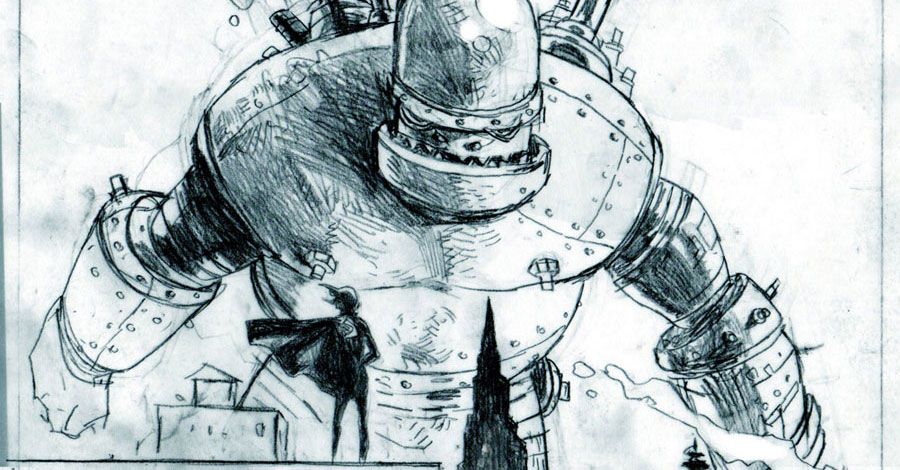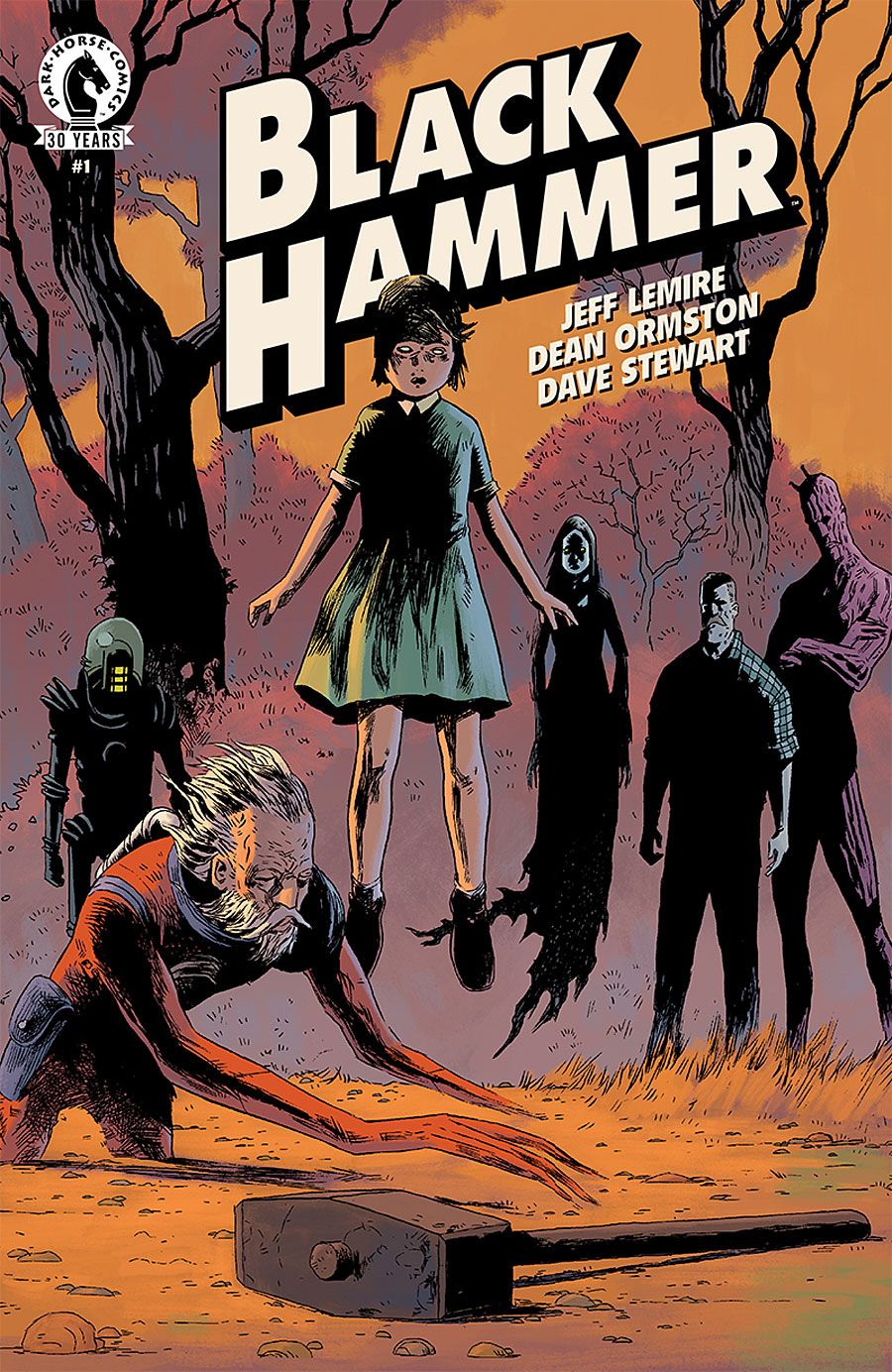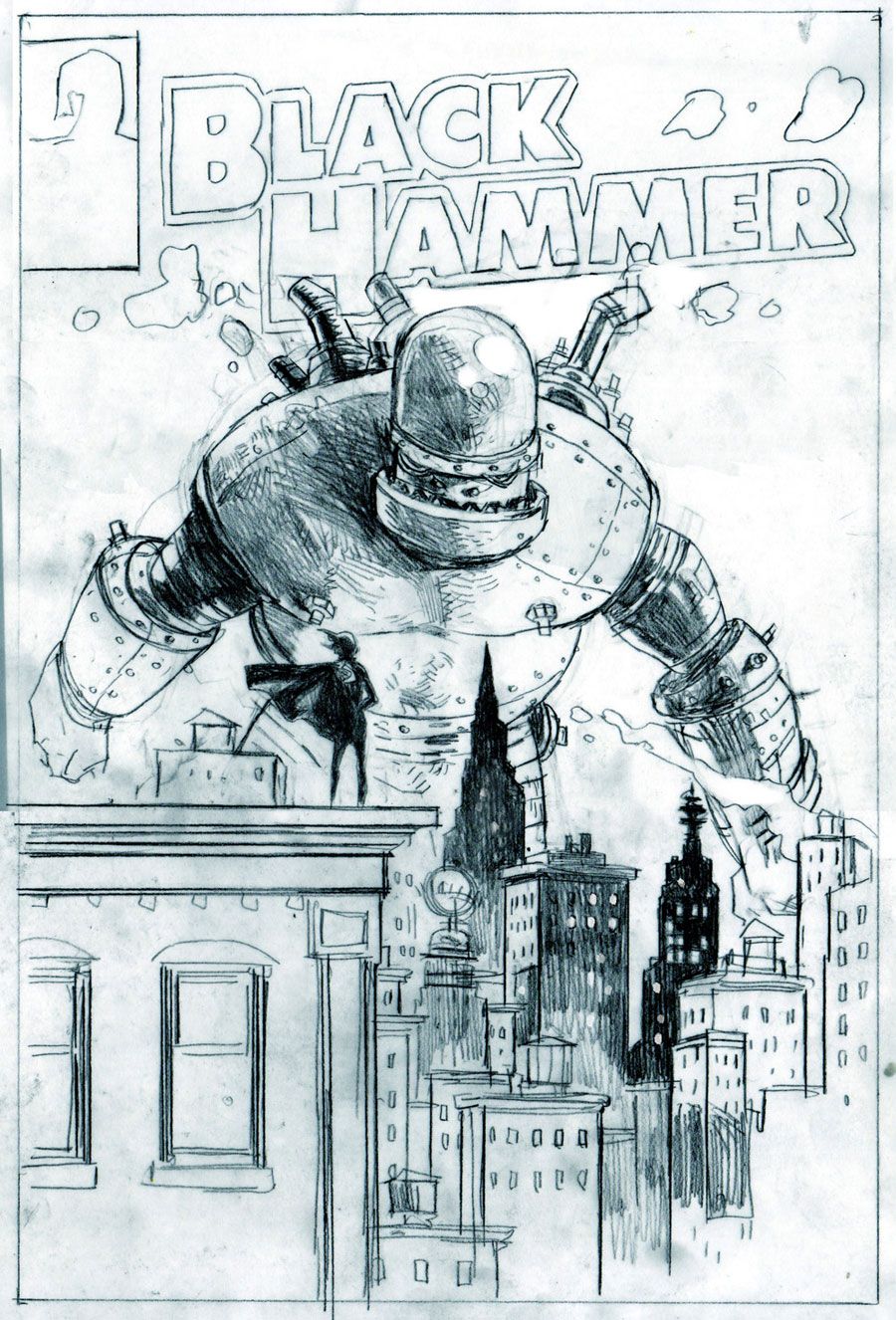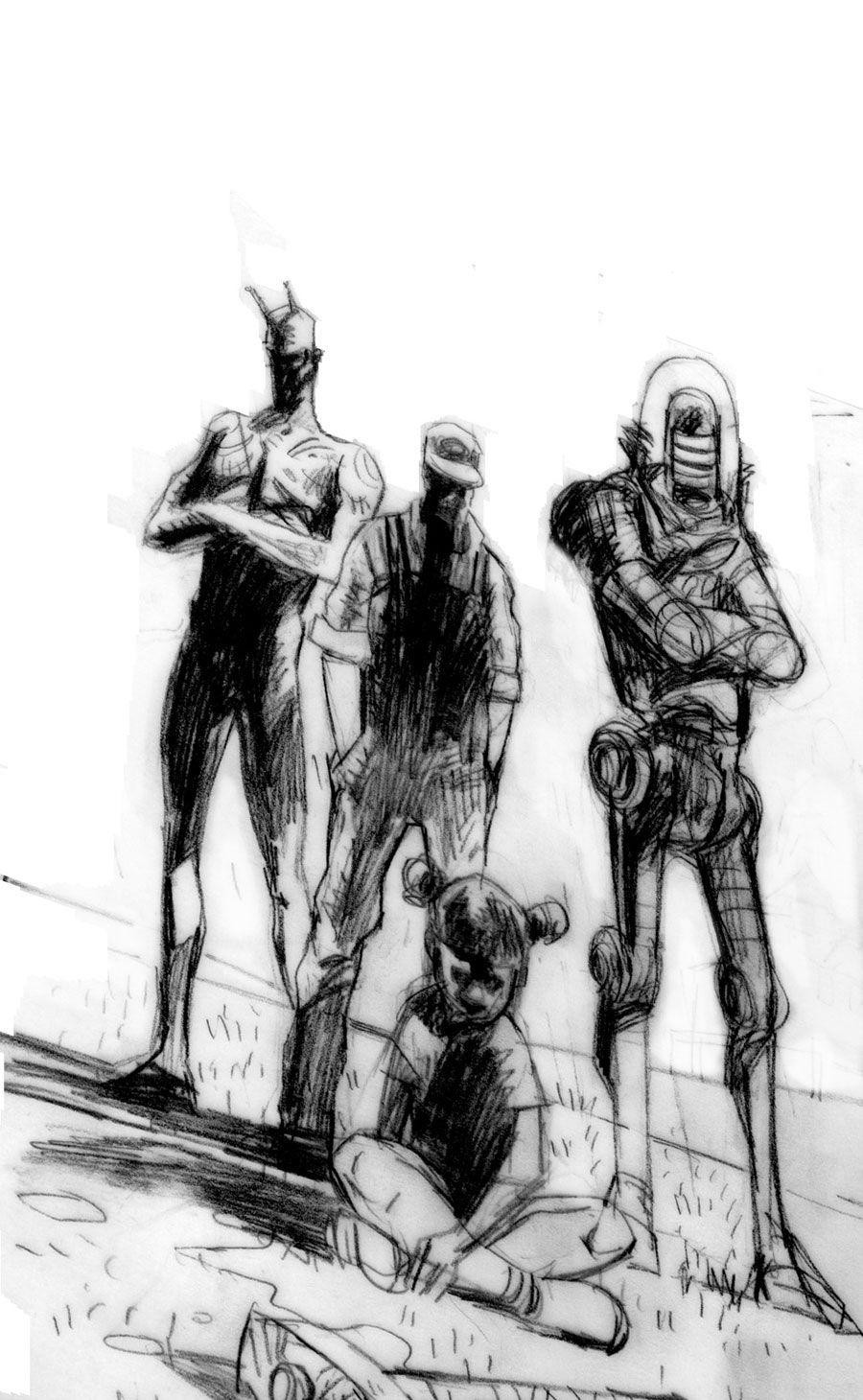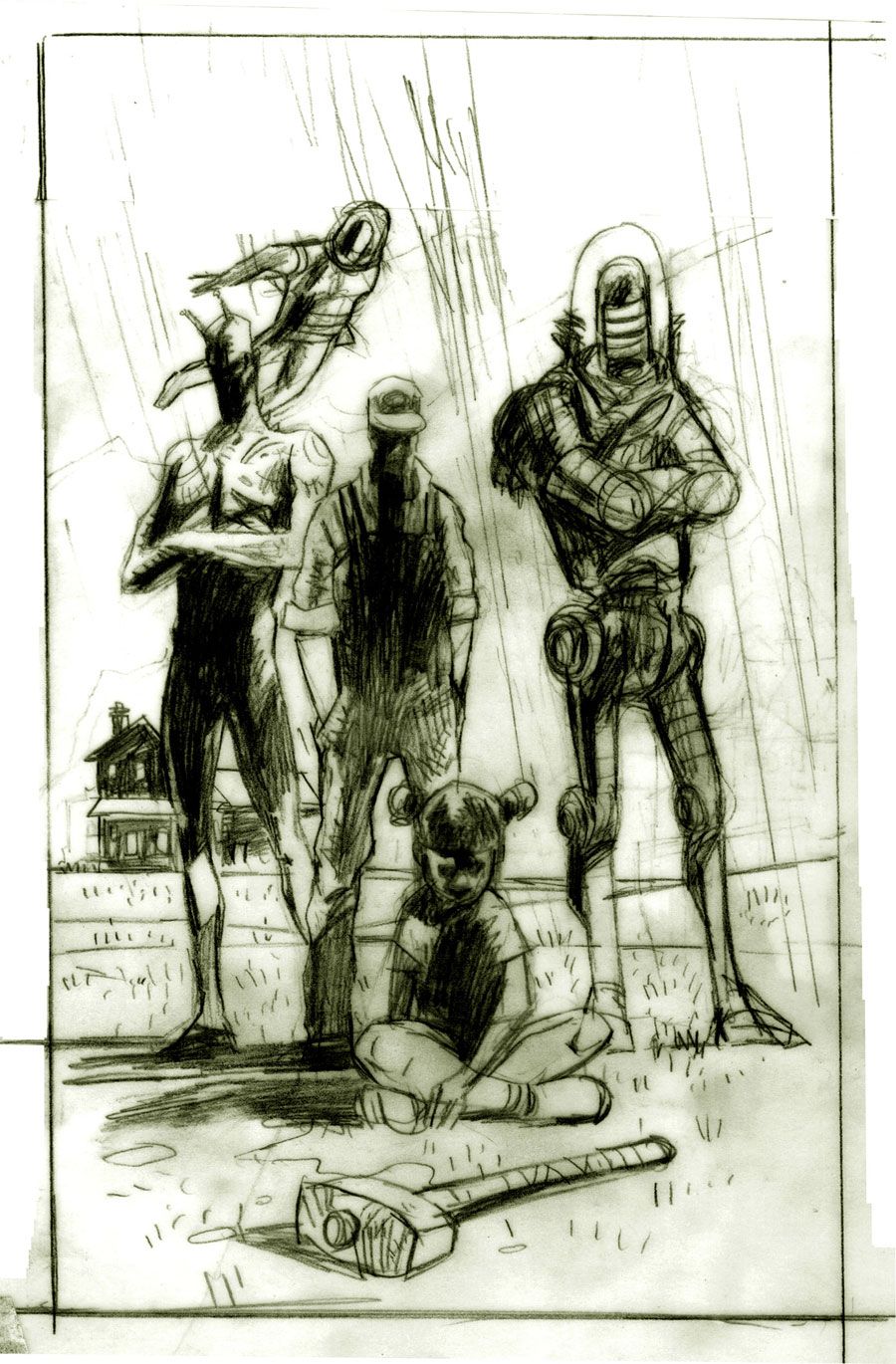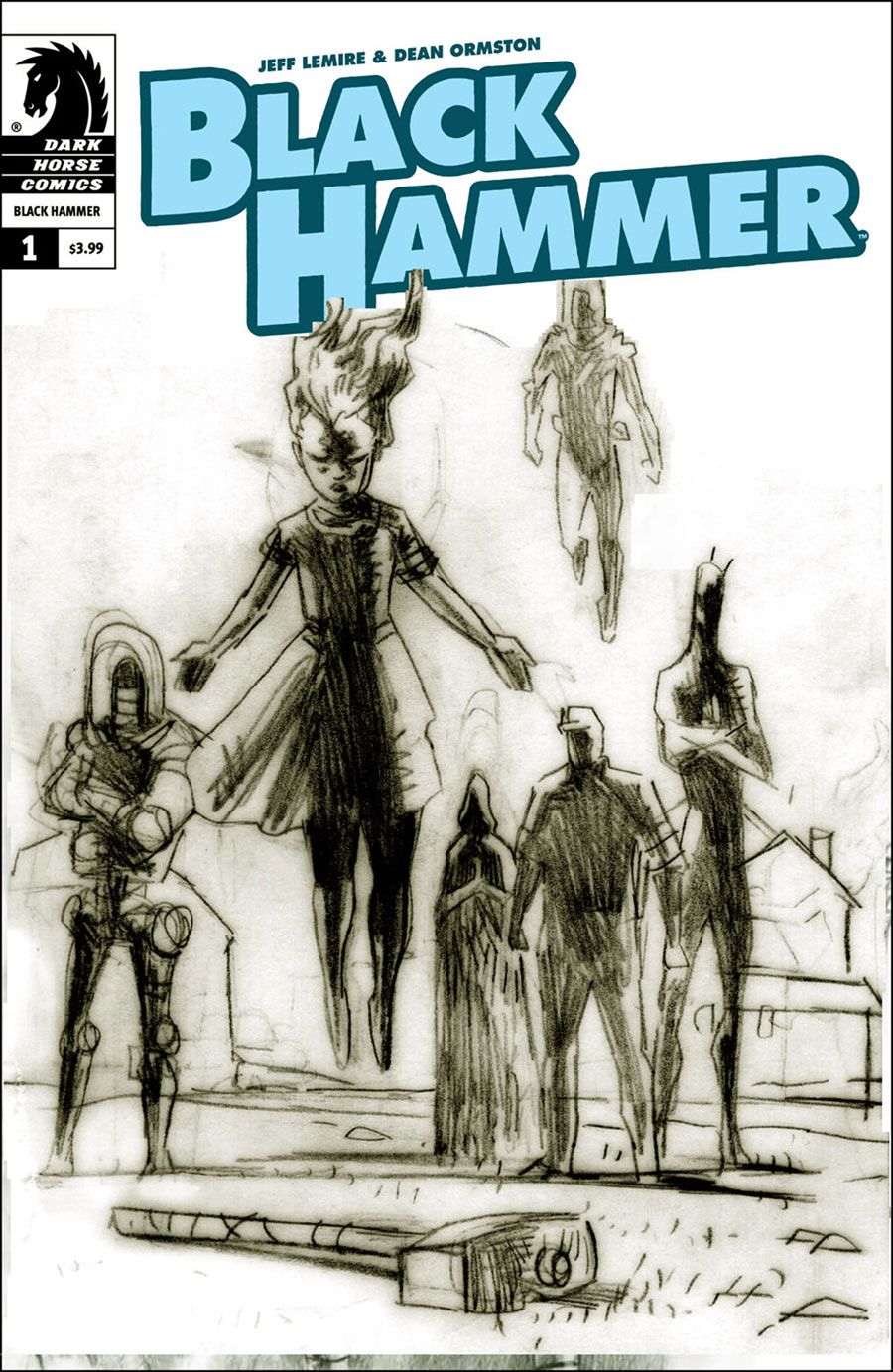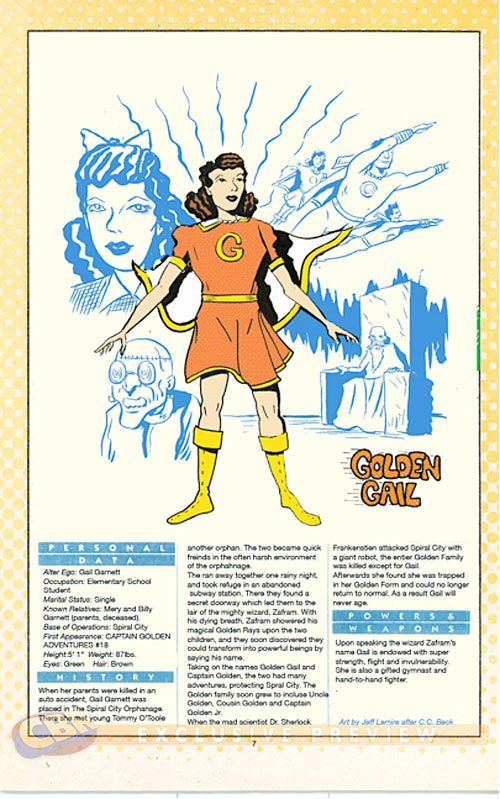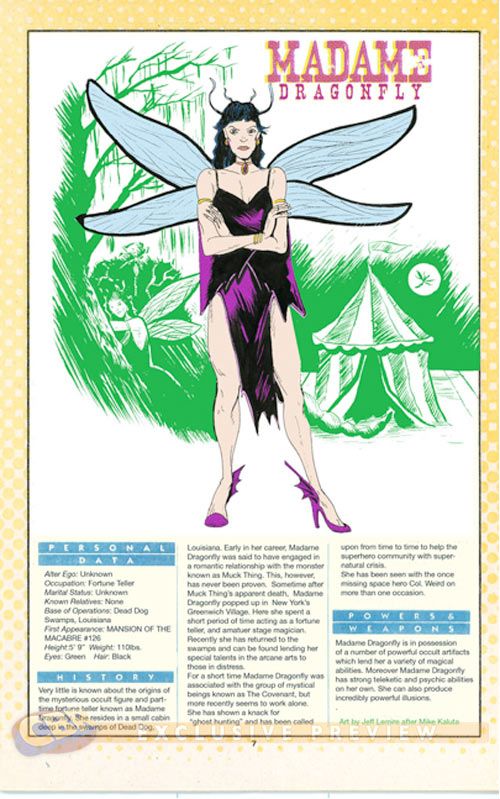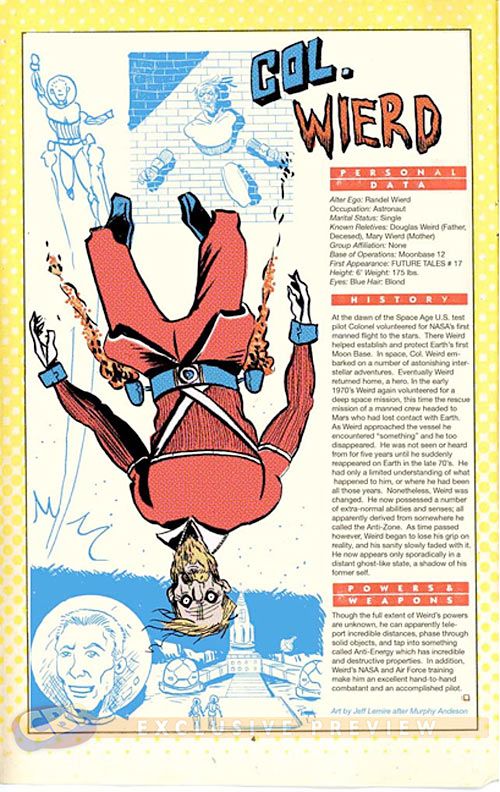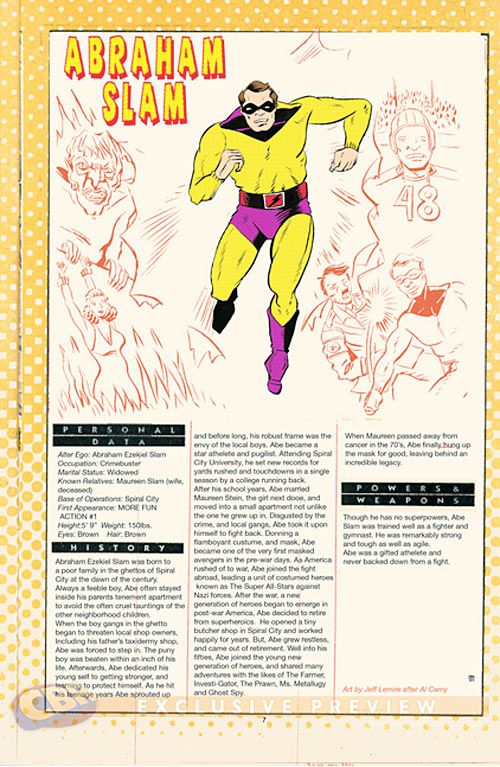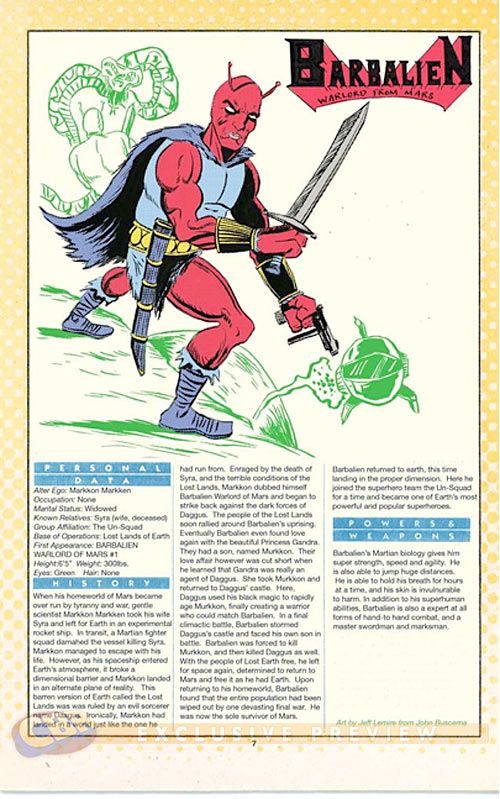SPOILER WARNING: The following article contains spoilers for "Black Hammer" #1, in stores in July.
Following a year-long delay, Dark Horse Comics announced today, at Emerald City Comicon, that Jeff Lemire and Dean Ormston's creator-owned "Black Hammer" will arrive in July. Joining them on the ongoing series are colorist Dave Stewart and legendary letterer Todd Klein, resulting in a creative team with a combined 25 Eisner Awards between them.
RELATED: Lemire Takes an Unbalanced Approach to "Moon Knight," Marvel's Craziest Hero
"Black Hammer" stars six superheroes attempting to rebuild their lives after they found themselves wiped from continuity during a "Crisis on Infinite Earths"-style event that nearly destroyed their hometown of Spiral City. Now, trapped on a farm in place that feels like millions of miles from home, Abraham Slam, Col. Weird, Talky-Walky, Barbalien, Golden Gail and Madame Dragonfly are picking up the pieces. But while some of them are adjusting to rural life quite nicely, a few of the superheroes keep cutting themselves (over and over again) on the glass.
CBR News connected with Lemire on the eve of Emerald City Comicon to discuss the highly anticipated series. The Canadian cartoonist also shared updates about Ormston's health following the English artist's stroke last year, and teased some important details about the secret origins of the now displaced superheroes of Spiral City.
CBR News: This series was originally slated to launch last year, but Dean Ormston suffered a stroke just after he finished drawing the first issue. Let's start there -- how is Dean doing?
Jeff Lemire: Fortunately, Dean is back on track physically. He's doing really well, he's back on his regular pace again. And you're right; originally, the book was supposed to launch last summer. Everything was going great, Dean was done the first issue, and then he had a stroke, which was obviously very scary for him and his family. But now, a year has passed, and he's been working for a few months. He's still doing physical therapy, and he's slowly getting back to his old self.
There is a great line in the first issue: "It may not be the life that we want, but it's the life we have. And at least we have it together." I know it's superheroes, but this is actually the story of the world's weirdest and perhaps most dysfunctional family.
Yeah. Pretty much. [Laughs] In a lot of ways, it's a lot closer to "Essex County" than it is to "Extraordinary X-Men," or whatever I'm doing at Marvel or DC. There are superheroes in it, but it's definitely an exploration of why I love superheroes, the history of superheroes, and all of that stuff. But underneath all of that, it's really a story about this family of oddball characters that are thrown together. You don't choose your family, you choose your friends. These guys didn't necessarily choose one another, but they're stuck now with one another and, for the most part, they're making the best of it. It's really fun to write these characters as real people and not have to figure out who or what they need to punch or fight each month. I want to let them breathe and be real people.
I read the first issue, and there are some excellent smaller moments with Barbalien talking religion with Father Quinn, and Abraham Slam and Golden Gail in the restaurant with some of the townsfolk, Tammy and Red. Those are great dramatic moments.
"Black Hammer" is never going to become a traditional superhero comic. It's never what I wanted to do with this. It really is the balance of the stuff that I do, usually, in my independent work like "Essex County" and exploring mysteries and science fiction through superheroes. It really the synthesis of all of the stuff that I have ever done. This book is probably the most of me that I have ever published. It has everything that I love in it.
How did these superheroes get to Mystery Farm?
Following a cataclysmic event, or crisis, or whatever you want to call it -- I guess that I shouldn't call it that -- a Secret War or a Convergence-type of event, these six superheroes that saved the day were wiped out of continuity. They wake up together in this mysterious small town on this farm.
In this world, superheroes have never existed. For the most part, it's a normal, every day, North American, small town. The only thing is, for whatever reason, they can't leave the boundaries of the town. If they do, it's catastrophic. They are prisoners, really. We pick up with them 10 years later, where they have, out of necessity, integrated themselves into the town. They've dropped their superhero personas and have blended in as best they can.
One of those blending in the best is the shape-shifting Barbalien. With a name like Mark Markz, he's obviously an analog for the Martian Manhunter, J'onn J'onzz?
I have no idea who you are talking about. [Laughs] I can't confirm that.
[Laughs] Okay. Fair enough. What can you tell us about Abraham Slam?
Of all of them, this is kind of Abe's perfect life. This is what he always wanted anyway. He's very happy here. He wanted a quiet life. He wanted a family. He wanted exactly what they have, whereas the other ones feel forced into this existence. They're not so content with where they are, so he really is the glue. In a lot of ways, he also rubs a lot of the others the wrong way because he's basically given up on finding a way home. He wants to stay. He's a Golden Age pulp, crime-fighting hero from the 1930s or 1940s. He's an old-fashioned kind of guy. The town really suits him. It fits his pace.
I'm predicting Talky-Walky as the breakout character. We're going to get a plush toy and key chains and everything.
[Laughs] Each of the characters epitomizes one era of comics that I really enjoy. Abe is a Golden Age crime-buster. Col. Weird is a 1950s "Mystery into Space"/Adam Strange or Captain Comet spacefaring superhero. And Talky-Walky is his robot sidekick.
Col. Weird is also like David Bowman from "2001: A Space Odyssey." He has had a strange encounter in deep space that's completely fried his brain. He's like an acid casualty, floating around the farm. He's a real wild card because you never know what he is going to say or do. He's almost like a ghost. He's a manic, crazed ghost that used to be a clean cut, militaristic astronaut character.
I won't spoil it, but Golden Gail has the best line in the first issue.
[Laughs] Yeah, Gail has quickly become my favorite character. Each issue in the first arc focuses on one character -- the whole ensemble is in every issue, but the thrust of each issue is around one character. And the thrust of the second issue is Gail. You get to see her quote/unquote secret origin, as well.
Gail, I think, of all of the characters is the most endearing. They all have interesting arcs, I hope, but hers is tragic and funny all at the same time. I really like her a lot. She's a Golden Age Marvel Family kind of character. When she transforms into her superhero persona, she becomes the age of when she first got her powers, which is like a nine or 10-year old girl, even though in reality, she's probably in her sixties or seventies. She's stuck as a little girl with the mind of an older woman.
You might think the Fountain of Youth aspect would be wonderful, but when you don't have the choice, it becomes almost like a curse because she can't really be who she really is.
Maybe you want your Fountain of Youth to keep you at 19 and not nine.
Exactly. At nine, you're a little limited about what impulses that you can act on. [Laughs] Let's put it that way.
And we get just a taste of Madame Dragonfly who, beyond Black Hammer, is the most mysterious character in the first issue. I know it's early, but I don't trust her.
There is a lot of mystery surrounding her, so I don't want to say too much. She is my version of a 70s "House of Mystery"/"House of Secrets"-type of character. She's part Madame Xanadu, part Abby from "Swamp Thing," and part Elvira. [Laughs] She has the Cabin of Horrors, which is her version of the House of Mystery. It's full of occult secrets and everything else. There is obviously a lot of history between her and the other characters that we as readers are not aware of -- at least, not in the first issue. Those details will be revealed as the story goes. There is definitely some bad blood between her and a lot of the other characters. She's almost ostracized herself from the house and lives almost on the outskirts of the farm by herself.
And while the series holds his name, we only see Black Hammer briefly in flashbacks. What can you tell us about Black Hammer?
Not too much, yet. That's one of the big mysteries of the book. I really want that one to play out in the pages rather than spilling anything here.
"Black Hammer" by Jeff Lemire and Dean Ormston is set to start in July.

